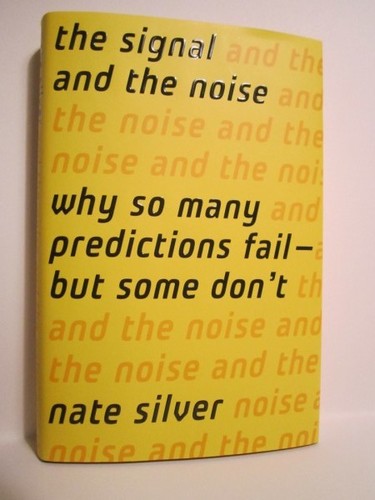I've been grinding through Nate Silver's book 'The Signal and the Noise' over the last few weeks and while it can, at times, get perhaps a little too deep into some dark statistical alleys, overall it is a fascinating read, and one I definitely recommend if for no other reason than for an excellent chapter on handicapping NBA basketball games.
If there is one major theme or takeaway from the book for me, I think it is best articulated in this quote, about two-thirds of the way through the book, in a chapter about how difficult it can often be in making sense of data, a problem only getting worse as the amount and availability of data continues to explode:
The US Government now publishes data on about 45,000 economic statistics. If you want to test for relationships between all combinations of two pairs of these statistics - is there a causal relationship between the bank prime loan rate and the unemployment rate in Alabama? - that gives you literally one billion hypotheses to test.
But the number of meaningful relationships in the data - those that speak to causality rather than correlation and testify to how the world really works - is orders of magnitude smaller. Nor is it likely to be increasing at nearly so fast a rate as the information itself; there isn't any more truth in the world than there was before the Internet or the printing press. Most of the data is just noise, as most of the universe is filled with empty space.
In 2013 I promise that you, as an informed, and opportunistic Talent professional will be hearing, seeing, talking, and thinking about Big Data. Data about job ad posting, data about talent assessment scores, data about compensation and retention, data about engagement, data about performance, and maybe even data about data.
As I wrote a couple of weeks ago, most organizations have plenty of data. More than they know what to do with. And the more they collect, as made really clear in the example above, the chances are high that it won't lead to a faster discovery of the truth - it will just unearth more paths to explore.
Which sometimes, certainly, might be needed, but other times, and maybe most of the time, only results in more ways to get lost.
Don't get caught up chasing data just to have more data. The truth isn't going anywhere, and once you think you have it figured out, and feel that the data you do have supports your beliefs, then you'd probably be better served acting, rather than collecting even more data.
Have you read The Signal and the Noise yet? Better get on it, just in case it becomes the 2013 version of Moneyball, and you won't want to feel left out!